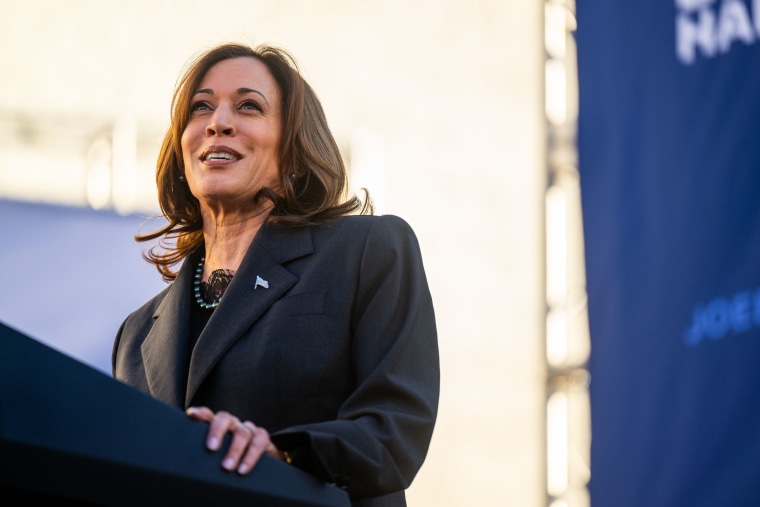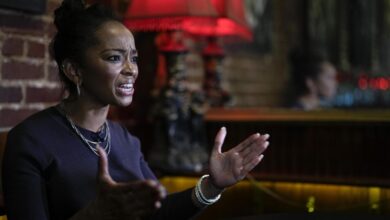Biden campaign makes big Black history push to re-energize Black voters

ATLANTA — This Black History Month, President Joe Biden’s re-election campaign is making a big push to publicize the Black history made under the Biden-Harris administration.
The question is how much that message matters to those Black voters who are wavering on the edges of the Biden coalition right now.
From a historically diverse administration, complete with the nation’s first Black vice president and defense secretary, to historic lows in Black unemployment and historic highs in Black business ownership, Biden’s re-election campaign has spent millions of dollars driving that record home to voters ahead of a general election in which he’ll need strong support among Black voters to secure victory.
“Black history is American history,” one Biden campaign radio ad begins. “Our sacrifices and achievements make this country stronger, so we celebrate Vice President Kamala Harris, Secretary of Defense Gen. Lloyd Austin and Supreme Court Justice Ketanji Brown Jackson.”

It’s one of two radio ads released by the campaign in celebration of Black History Month. The spot is airing in battleground-state cities with large Black populations, including Atlanta, Philadelphia, Milwaukee and Detroit, and on popular radio shows like the D.L. Hughley Show and The Breakfast Club.
“President Biden has demonstrated his commitment to Black America from day one by building a team of history makers,” deputy campaign manager Quentin Fulks said in a statement released alongside the ads.
But recent interviews by NBC News suggest Biden’s efforts to highlight what his campaign has framed as a historic commitment to the Black community may be undercut by sustained backlash to his policy stances, particularly what some voters perceive as his rejection of their demands for a cease-fire in Gaza amid the Israel-Hamas war.
Rev. Devon Jerome Crawford was the guest pastor at Ebenezer Baptist Church in Atlanta last weekend, while Sen. Raphael Warnock, the senior pastor, attended the Munich Security Conference. In a sermon built around Black history, Crawford often tied Scripture to politics.
“Yes, we’ve had a Black president. Yes, we have a Black vice president. Yes, we’ve had Black attorneys general, we’ve had Black billionaires and celebrities,” Crawford said. “But for every Oprah Winfrey, there are thousands of Black folks living in squalor.”
During his 30-minute sermon, Crawford called for political mobilization on topics ranging from the increased closures of predominantly Black public schools to Georgia’s efforts to expand cash bail, which he says “functionally criminalizes poverty.” But the sermon quickly moved beyond domestic issues, ultimately landing on the “disorienting depression” of military occupation.
“Being forced to leave a place you’ve endowed so much meaning and so much purpose in will cause you to feel some depression,” Crawford said, speaking of the exile of Judeans to Babylon. “We would do well to remember this as we consider the 1.9 million people that have been displaced in the last four months as a consequence of the bombardment in Gaza.”
Few places are more emblematic of America’s Black history — and of Black voters’ current political power — than Ebenezer Baptist Church, America’s “freedom church.”
The 138-year-old church served as the spiritual home of Dr. Martin Luther King Jr. and became a beacon of the fight for civil rights. It’s also the current home of Sen. Raphael Warnock, who played a key role in turning once-red Georgia into a purple battleground state with his winning 2020 and 2022 campaigns. The senator has maintained his role as the church’s senior pastor despite a busy schedule, finding time to deliver a weekly sermon alongside a rotating cast of guest pastors.
Crawford’s empathy for those living in Gaza is in line with how thousands of Black clergy members nationwide view the ongoing war there, and some have voiced their support for a cease-fire through open letters to the White House and sit-down meetings with Biden administration officials. This week, the executive branch of the African Methodist Episcopal Church, one of the nation’s oldest Black Christian denominations, called on the U.S. government to withdraw financial support from Israel.
A number of congregants at Ebenezer Baptist appear to agree. Many of them were a part of the historic coalition of voters that mobilized in 2020, and again in 2022, to ensure their pastor was victorious in his Senate bid. They’ll be critical again in 2024.
“Oppression somewhere is oppression everywhere, so if you’re funding a genocide across the sea, that does not convince me that you care about Black people in America,” said 21-year-old Adeola Adelekan, who attended the Sunday service.
Adelekan said that despite her frustrations over the Biden administration’s handling of the war in Gaza, she still plans to vote for the president should he face former President Donald Trump in November. It’s a position the campaign anticipates many voters will take despite their reservations when presented with a Trump-Biden choice.
“We know there is more work to do,” Fulks said in regard to Biden’s efforts to deliver for Black Americans. “The fundamental choice in this election is between Joe Biden, who wakes up every day thinking about how he can make Americans’ lives better, and Donald Trump, who wakes up every day thinking about how he can make his life better.”
Polling shows that Black voters are largely with Biden but backs up the notion that he has work in front of him. NBC News’ latest national poll found that 75% of Black voters polled said they’d vote for Biden, compared to 16% for Trump. That’s a high margin — but lower than how voters said they voted in 2020, when Black respondents who said they cast ballots that year split 91% for Biden to 8% for Trump.
“I hate the alternative,” Adelekan said of her support for Biden. “It’s not because I think that I support him as a president, but it’s because I support the other person even less.”
When asked if Biden’s “team of history-makers” makes her more enthusiastic about supporting the president in the upcoming election, Adelekan replied with a resounding “no.”
“Black history’s always being created,” another college-aged Black voter in Atlanta, Johnathan, said while downplaying the significance of Biden’s team of history-makers. “I don’t just go by the ethnicity of people sitting in chairs or in offices.”
Hundreds of miles away, in Flint, Michigan, another Black clergy leader struck a different tone than Crawford, preaching the gospel of the Biden administration during a news conference alongside Biden-Harris campaign co-chair Mitch Landrieu and Rep. Dan Kildee, D-Mich.
“This president has receipts because the first vice president of color is in place because of him. The first Supreme Court Justice of color is because of him. I’m not talking about promises. This is receipts,” Pastor Hurley J. Coleman Jr. said.
It’s clear that not all Black voters value those receipts equally.
“All of that is semantics,” said Tre, a Black voter who opted not to share his last name at a Nikki Haley event in Dallas. He voted for Barack Obama for president twice before voting for Trump in 2016. After souring on Trump, he opted to write-in a candidate in 2020 and still has no plans to vote for Biden in 2024.
“The Supreme Court, Ketanji Brown Jackson is not even a factor because of the Republican lean in it,” he said. “So all of this is semantics, unless he does something legislative that is targeted towards Black people.”























































